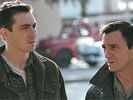Eye For Film >> Movies >> Infamous (2006) Film Review
After admiring Philip Seymour Hoffman’s extraordinary performance in last year’s Capote, it is impossible not to compare English actor Toby Jones’s interpretation of the diminutive homosexual author of Breakfast At Tiffanys in writer/director Douglas McGrath’s Infamous, which covers exactly the same ground, namely Truman’s investigation of the Clutter murders in Kansas that resulted in his last great work, In Cold Blood.
McGrath’s film emphasizes Capote’s acerbic wit, addiction to gossip, self deprecating humour and irresistible charm. His high voice, flamboyant dress sense and ubercampness, which he liked to exaggerate for theatrical effect, disguised a vulnerable, psychologically wounded, insecure Southerner in New York, bolstered and beloved by a flock of fashionable females.

The director’s approach is an odd mixture of documentary-style talking heads and a dramatic reconstruction of Capote’s time in Holcomb, a one-horse town, outside of which the Clutter family, well liked and respected in the community, were brutally murdered in their isolated farmhouse by two itinerant criminals. The cinematography in Kansas is worthy of an exhibition at the Guggenheim, superb still lives of bleak and open landscapes, the most memorable being Capote and his childhood friend Harper Lee (Sandra Bullock), standing on a raised wooden platform in the middle of a field where the train had stopped, two figures alone with their luggage, Truman’s three grand trunks and Lee’s two modest bags.
There are a lot of excellent jokes and an air of playfulness that eventually irritates the serious minded Lee to the point where she leaves Truman to his own devices. By that time, he has broken down the wall of animosity that made his role as an investigative journalist, originally for The New Yorker, impossible (“No one will talk to me”). Once accepted into the home of local sheriff Alvin Dewey (Jeff Daniels) for Christmas lunch, he drops so many names with his anecdotes of working with Bogey, Frank (Sinatra) and John (Huston) that the ladies of Holcomb can’t get enough.
His relationship with Perry Smith (Daniel Craig), the more sensitive and artistic of the killers, is strongly suggested in the book and understated in the Hoffman film. Here, Truman’s infatuation is undeniable and Perry’s response emotionally intense. Through no fault of actor or director, Craig is miscast. Mark Ruffalo, who was going to play Perry, but didn’t at the last moment, would have been a better choice. Craig is too tall and powerfully built and his striking good looks that enhance James Bond don’t fit the profile of this mixed up, abandoned drifter.
And so it is that Jones comes too late for accolades and awards – Hoffman has already “done” Truman. On one level, this is a deliciously superficial performance, so girlish as to be hysterical, and on another it has unexpected depths, hinting at Capote’s inability to comprehend true love and fulfill his undoubted talent. As his literary agent says, concerning the final retribution of the murderers, after five years of appeals and legal wrangles, “There were three deaths on those gallows that night.”
After the phenomenal success of In Cold Blood, Capote never wrote another thing.
Reviewed on: 15 Jan 2007


















